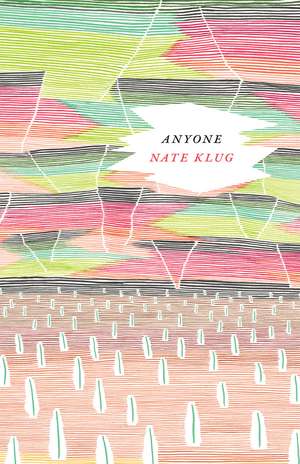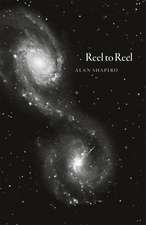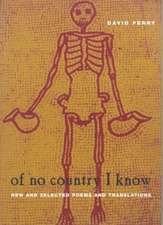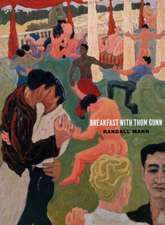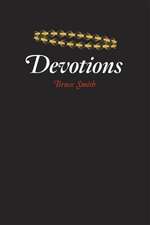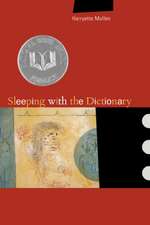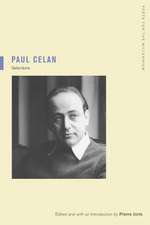Anyone: Phoenix Poets
Autor Nate Klugen Limba Engleză Paperback – 19 mar 2015
Milton’s God
Where I-95 meets The Pike,
a ponderous thunderhead flowered—
stewed a minute, then flipped
like a flash card, tattered
edges crinkling in, linings so dark
with excessive bright
that, standing, waiting, at the overpass edge,
the onlooker couldn’t decide
until the end, or even then,
what was revealed and what had been hidden.
Using a variety of forms and achieving a range of musical effects, Nate Klug’s Anyone traces the unraveling of astonishment upon small scenes—natural and domestic, political and religious—across America’s East and Midwest. The book’s title foregrounds the anonymity it seeks through several means: first, through close observation (a concrete saw, a goshawk, a bicyclist); and, second, via translation (satires from Horace and Catullus, and excerpts from Virgil’s Aeneid). Uniquely among contemporary poetry volumes, Anyone demonstrates fluency in the paradoxes of a religious existence: “To stand sometime / outside my faith . . . or keep waiting / to be claimed in it.” Engaged with theology and the classics but never abstruse, all the while the poems remain grounded in the phenomenal, physical world of “what it is to feel: / moods, half moods, / swarming, then darting loose.”
Where I-95 meets The Pike,
a ponderous thunderhead flowered—
stewed a minute, then flipped
like a flash card, tattered
edges crinkling in, linings so dark
with excessive bright
that, standing, waiting, at the overpass edge,
the onlooker couldn’t decide
until the end, or even then,
what was revealed and what had been hidden.
Using a variety of forms and achieving a range of musical effects, Nate Klug’s Anyone traces the unraveling of astonishment upon small scenes—natural and domestic, political and religious—across America’s East and Midwest. The book’s title foregrounds the anonymity it seeks through several means: first, through close observation (a concrete saw, a goshawk, a bicyclist); and, second, via translation (satires from Horace and Catullus, and excerpts from Virgil’s Aeneid). Uniquely among contemporary poetry volumes, Anyone demonstrates fluency in the paradoxes of a religious existence: “To stand sometime / outside my faith . . . or keep waiting / to be claimed in it.” Engaged with theology and the classics but never abstruse, all the while the poems remain grounded in the phenomenal, physical world of “what it is to feel: / moods, half moods, / swarming, then darting loose.”
Din seria Phoenix Poets
-
 Preț: 93.19 lei
Preț: 93.19 lei -
 Preț: 83.03 lei
Preț: 83.03 lei -
 Preț: 123.32 lei
Preț: 123.32 lei -
 Preț: 93.60 lei
Preț: 93.60 lei -
 Preț: 91.57 lei
Preț: 91.57 lei -
 Preț: 106.70 lei
Preț: 106.70 lei -
 Preț: 83.35 lei
Preț: 83.35 lei -
 Preț: 93.02 lei
Preț: 93.02 lei -
 Preț: 213.87 lei
Preț: 213.87 lei -
 Preț: 93.19 lei
Preț: 93.19 lei -
 Preț: 92.61 lei
Preț: 92.61 lei -
 Preț: 93.60 lei
Preț: 93.60 lei -
 Preț: 83.70 lei
Preț: 83.70 lei -
 Preț: 93.84 lei
Preț: 93.84 lei -
 Preț: 95.29 lei
Preț: 95.29 lei -
 Preț: 93.60 lei
Preț: 93.60 lei -
 Preț: 94.25 lei
Preț: 94.25 lei -
 Preț: 91.57 lei
Preț: 91.57 lei -
 Preț: 146.35 lei
Preț: 146.35 lei -
 Preț: 167.35 lei
Preț: 167.35 lei -
 Preț: 287.67 lei
Preț: 287.67 lei -
 Preț: 168.11 lei
Preț: 168.11 lei -
 Preț: 158.82 lei
Preț: 158.82 lei -
 Preț: 166.49 lei
Preț: 166.49 lei -
 Preț: 197.24 lei
Preț: 197.24 lei -
 Preț: 227.89 lei
Preț: 227.89 lei -
 Preț: 137.60 lei
Preț: 137.60 lei -
 Preț: 213.74 lei
Preț: 213.74 lei -
 Preț: 160.56 lei
Preț: 160.56 lei -
 Preț: 159.01 lei
Preț: 159.01 lei -
 Preț: 168.11 lei
Preț: 168.11 lei -
 Preț: 144.98 lei
Preț: 144.98 lei -
 Preț: 270.74 lei
Preț: 270.74 lei -
 Preț: 157.86 lei
Preț: 157.86 lei -
 Preț: 169.63 lei
Preț: 169.63 lei -
 Preț: 159.39 lei
Preț: 159.39 lei -
 Preț: 167.13 lei
Preț: 167.13 lei -
 Preț: 167.73 lei
Preț: 167.73 lei -
 Preț: 168.11 lei
Preț: 168.11 lei -
 Preț: 227.15 lei
Preț: 227.15 lei -
 Preț: 177.99 lei
Preț: 177.99 lei -
 Preț: 168.32 lei
Preț: 168.32 lei -
 Preț: 169.63 lei
Preț: 169.63 lei -
 Preț: 223.74 lei
Preț: 223.74 lei -
 Preț: 212.01 lei
Preț: 212.01 lei -
 Preț: 130.83 lei
Preț: 130.83 lei -
 Preț: 156.86 lei
Preț: 156.86 lei -
 Preț: 240.53 lei
Preț: 240.53 lei
Preț: 166.19 lei
Nou
Puncte Express: 249
Preț estimativ în valută:
31.80€ • 34.53$ • 26.72£
31.80€ • 34.53$ • 26.72£
Carte tipărită la comandă
Livrare economică 22 aprilie-06 mai
Preluare comenzi: 021 569.72.76
Specificații
ISBN-13: 9780226196954
ISBN-10: 022619695X
Pagini: 64
Dimensiuni: 140 x 216 x 10 mm
Greutate: 0.09 kg
Ediția:1
Editura: University of Chicago Press
Colecția University of Chicago Press
Seria Phoenix Poets
ISBN-10: 022619695X
Pagini: 64
Dimensiuni: 140 x 216 x 10 mm
Greutate: 0.09 kg
Ediția:1
Editura: University of Chicago Press
Colecția University of Chicago Press
Seria Phoenix Poets
Notă biografică
Nate Klug is the author of Rude Woods, a book-length adaptation of Virgil’s Eclogues. A UCC-Congregationalist minister, he has served churches in North Guilford, Connecticut, and Grinnell, Iowa.
Cuprins
Acknowledgments
Work
Conjugations
Milton’s God
Letter of Introduction, Samuel Palmer to His Patron
Thinking
The Choice
Dusk in Jasper County
Home
Neighbors
To Egnatius, Who Won’t Stop Smiling
Jon’s Jog
Advent
Parade
A Message
Lullaby on Election Eve
Lost Seasons
Shifts
In Calico Rock, Arkansas
Novitiate
Gift
Three Days
Octonaire on the World’s Vanity and Inconstancy
Sound from Sound
Sacred Harp Sing, Bethel Primitive Baptist
Anyone
Dare
Errand
Predestination
The Truly Fucked
Petition
The Gladiator
Twenty-Something
Trail
True Love
Squirrels
Mercy
Observer
Work
Conjugations
Milton’s God
Letter of Introduction, Samuel Palmer to His Patron
Thinking
The Choice
Dusk in Jasper County
Home
Neighbors
To Egnatius, Who Won’t Stop Smiling
Jon’s Jog
Advent
Parade
A Message
Lullaby on Election Eve
Lost Seasons
Shifts
In Calico Rock, Arkansas
Novitiate
Gift
Three Days
Octonaire on the World’s Vanity and Inconstancy
Sound from Sound
Sacred Harp Sing, Bethel Primitive Baptist
Anyone
Dare
Errand
Predestination
The Truly Fucked
Petition
The Gladiator
Twenty-Something
Trail
True Love
Squirrels
Mercy
Observer
Recenzii
"Klug is a UCC-Congregationalist minister, and his poems are often explicit about faith, but to call him a religious poet minimizes his merits. . . . Klug’s versions of Catullus, Virgil, and a marvelous, profane Horace are 'after' these poets in at least two senses—the ordinary linguistic sense and the sense of honoring and carrying on a tradition of poetic perception as those secular Roman poets are resurrected under the pen of a contemporary American Christian. In every poem, Klug makes every syllable count. Every punctuation mark qualifies, securing each clause in the form, and when a poem is unpunctuated, the omission is calculated, intentional. Klug looks like a minimalist, but his minimalism concentrates, burnishes: 'hills fuzzed with a concentration of mist / so pale it cannot be darkness, then it is.' Here the visual is rendered sonically, so perfectly one wants to involve the rest of the senses, to speak the lines, to taste the syllables. Not to be missed."
"To the poetic imagination, the world isn't described through poetry; it is poetry, at least when the world is seen most clearly and truthfully. Klug's work offers exactly this kind of reorienting of perspective, showing us the world in all of its particularity and with all of its resonances."
"Anyone is a blade of a book. . . . Klug’s aesthetic is a study in what restraint can open--and I want to call his poems perfect now, not as compared to anything else, but because they couldn’t be another way, perfect in themselves. . . . While Bishop’s presiding metaphor is the shell, Klug’s is the edge: both as what cuts-through and as what’s in-between. As in Bishop, the reader is shown everything and has the nagging sense that what is most important has been withheld."
“Resolutely composed. . . . Klug reminds us that the work of sense-making, one part with the work of feeling, is always beginning. And a genuine beginning—no small thing—is what he has made with this beautifully realized collection.”
“These astonishing moments of searching quiet in Klug’s poetry—whether they unravel in an Amtrak parking lot, in the gardens and atriums of ancient Rome, or in the private examinations of his own faith—never suggest a sense of possession or personal ownership. The searching in his poetry is rather a kind of merciful fishing, where you hold a catch in your hand, marvel at the polished scales and breathing gills, and then release it back in the water to be perhaps caught again—by anyone.”
“Nate Klug’s Anyone is a seduction by way of small astonishments revealed by a mind in the act of observation and inquiry.”
"I can't get Nate Klug's spare, clear poems out of my head, and thank God for that. I would say that he is at the beginning of a great career, but that sells this book short, which seems to me to already have elements of greatness. Anyone interested in poetry, regardless of camp or creed, is going to want to own this book."
"Nate Klug's Anyone is a searching book. Its voice is quiet, vibrant, musical, and steadily, unusually, egoless. A hundred years from now someone—perhaps anyone—who wanted to know what it is like to perceive and feel, think and believe, in our times could find the answer in these poems, so touched by the past, so alert to the world in and around them. Like George Herbert's "virtue," they shine both in the day and in the night."
"Klug's poems are like containers catching rain, ping by ping, they have perfect sound patterns made by the formation of a water they create themselves falling in. The Merton-Zukovsky epigraph at the start—‘In the whole that is unnecessary, every small thing becomes necessary’—perfectly captures the background for such finely tuned poems, as necessary as rain."
"Klug chooses a different route, eluding efforts to read his work as biography in favor of a more generalized presentation of thought and experience that could occur to anyone. He creates a sort of vacant space for the reader to step into. And the reader does step in"
